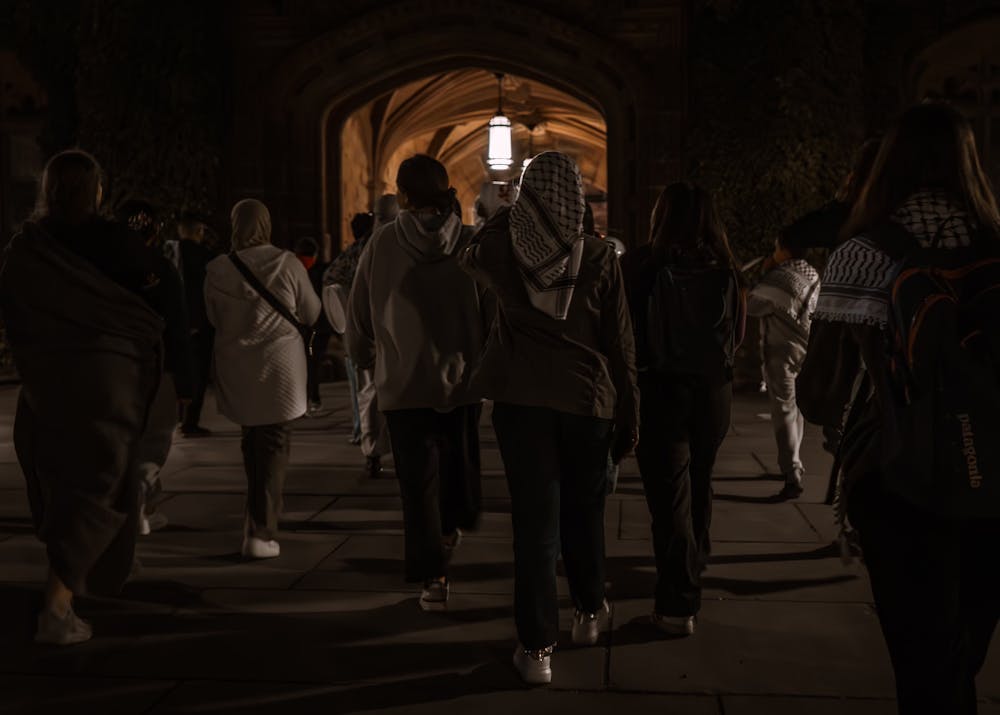Last week, fliers promoting Palestinian hate and the ongoing genocide in Gaza were found on campus near Spelman Hall. In light of this, and the rise in anti-Muslim and anti-Palestinian hate in New Jersey in 2024, it’s imperative for Princeton students to stand on the right side of history. Of course, it is the responsibility of students who are already active in the cause to continue to affirm their commitment to the pro-Palestine, anti-genocide movement. However, now more than ever, it is paramount that students who have previously been unsure of their stance make the choice to oppose genocide and support Palestinian rights. All students should choose to support the pro-Palestine movement and to encourage the University’s divestment from Israel as a form of financial pressure on the Israeli economy, even if they haven’t previously.
Some students might be unsure of whether they will be welcomed into the pro-Palestinian movement at Princeton. They may feel dissuaded by national media coverage or alarmist emails from University administrators that mischaracterize Gaza encampment protestors as violent, antisemitic agitators. But my personal experience at the encampment completely contradicts this fabrication.
Last semester, Princeton students erected the “Gaza Solidarity Encampment” on April 25, initially in McCosh Courtyard and later on Cannon Green. Over the weeks that followed, the encampment grew in size and became a model of community care, teaching students about the importance of showing up for one another and welcoming community members into the Princeton campus. Students — myself included — stayed at the encampment all night in cold temperatures, participated in hunger strikes, organized rallies and teach-ins. We formed groups that worked on various aspects of the pro-Palestine movement on campus, including a bargaining committee that met with administrators. Most importantly, we collectively advocated for justice for Palestinians and an end to the genocide.
When I reflect on my time at the encampment, I think back fondly on the community members who brought food for protesters everyday, the children who found joy playing with each other, or the town halls that encouraged democratic voting and decision-making. Of my time at the encampment, what I remember the most is the overwhelming sense of love, the welcoming atmosphere, and the conviction that I was using my privilege as a Princeton student to fight for Palestinian liberation. There’s still time for all students to make the right choice, regardless of — and perhaps especially if — they have previously been on the fence.
The start of a new school year is the perfect opportunity to get involved with activist movements of global significance. We owe it not only to ourselves and the past, present, and future generations of University activists, but also to Palestinians and to people’s human rights everywhere.
Princeton Israeli Apartheid Divest’s (PIAD) divestment proposal outlines various criteria for divestment which include 129 companies in which Princeton presently invests, whose work, either directly or indirectly, contributes in some way to the ongoing genocide in Gaza. Although several categories are broader, to the extent of urging that Princeton divest from any company operating in or contributing to the Israeli economy, PIAD also identifies multiple categories which are directly related to the genocide. One of these, for example, relates to the construction of walls, settlements, and checkpoints, the surveillance and discrimination of Palestinian citizens, and most importantly weapons manufacturing and supplying.
Students at the encampment recognized the global platform that we have as Princeton students, and the power that our collective voice holds in shaping a global narrative and the course of history. In line with both Princeton’s historical tradition and the precedent set by fellow universities such as Columbia and UPenn, we too are responsible for changing the course of history. We must continue to strive to bring an end to the genocide, to accelerate Princeton’s divestment, and to keep the spark of campus activism alive. As such, we must stand together and use our voices and our platform to effectuate social good.
Based on the University’s divestment guidelines, established in 1997, all students must stand together and display “sustained campus interest” and “consensus,” which we can demonstrate through a referendum on divestment. Now more than ever, it’s important for us all to pressure administrators for the right to vote on a referendum and to make clear our demand for divestment. For those students who have previously been unsure about Princeton’s role in the genocide, unsure of how safe it may be for them to protest, or felt that they weren’t sufficiently educated to take a stance on the issue — this is the time to act. There are many ways to get involved, if only by demanding a referendum and voting in favor of divestment. It’s never too late to act, or to choose to condemn genocide.
We must stand on the side that opposes violence and genocide, and we must demand that Princeton also be on the right side of history. For our goals — of ending the genocide and implementing the necessary sanctions, including financial pressure, that accompany the breaching of human rights and international law — to be successful, we need every voice working together. As noted in a tweet reposted by American activist Adam Eli: “You are allowed to say, at any point, I can’t support this. Even if you did. Even if you were unsure. You can at any point say “this has gone too far.” And while the best time to say this was earlier, the second best time is now.” It’s not too late to commit to fighting for Palestinian rights, and this begins by reevaluating the financial role that Princeton plays in the genocide.
Asa Santos is a senior Anthropology major from London and São Paulo, minoring in Gender & Sexuality Studies and Global Health & Health Policy. Santos' column, "Opening the Gates," runs every two weeks on Tuesdays. All of Santos' columns can be read here.









